These go to 11…
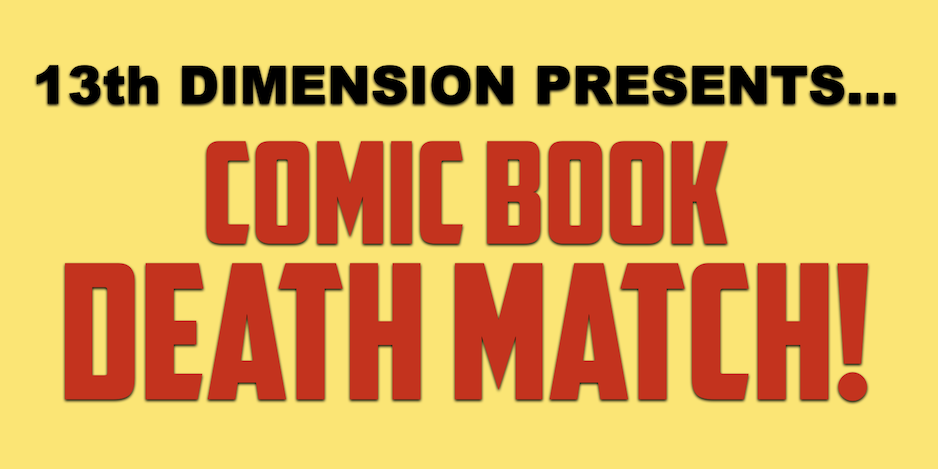
Fred Van Lente’s COMIC BOOK DEATH MATCH is back and better than ever! Now, as a monthly feature for 2024!
See, Marvel this year is celebrating the 40th anniversary of 1984’s 12-issue Marvel Super Heroes Secret Wars by re-releasing each installment as a Facsimile Edition every month. And of course, what is the DC event it’s always compared to? Why, 1985’s Crisis on Infinite Earths. And that series is also being re-released monthly. (It started in April.)
It’s a great time to revisit two maxiseries that redefined comics for good and for bad. You can click here to find the previous entries, but right now the tally stands at Crisis 6, Secret Wars 4. (The Secret Wars #11 Facsimile Edition is out Wednesday, Nov. 6)
Ring the bell, Fred!
—
By FRED VAN LENTE
Marvel Super Heroes Secret Wars #11: “…And Dust to Dust!”
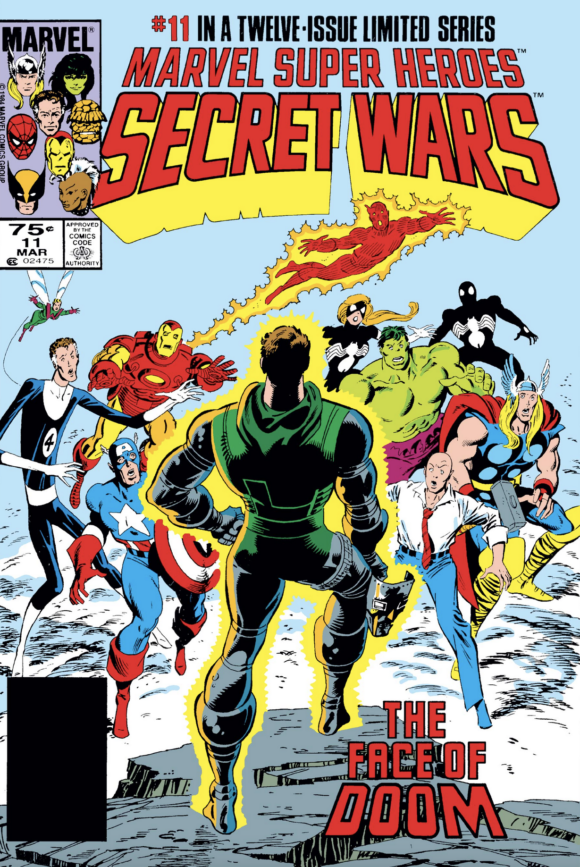
I have agreed with columnist George Will exactly once, when he said the game of football combines the two worst aspects of American life: violence and committee meetings.
That’s a pretty good summation of this issue of Secret Wars, too.
Like its Crisis counterpart, this is a quiet, stock-taking story after 10 issues of bombast. Because he defeated the Beyonder and absorbed his powers last issue, God-Doom declares that nobody has any reason to fight anymore, and cures Molecule Man of his insecurities. Molecule Man gathers all the villains together and flies them off in the Beyonder-stolen chunk of Denver back to Earth.
Though I am pretty sure that Molecule Man’s control over the basic building blocks of matter can’t do jack for faster-than-light travel, so the bad guys have a several-thousand year journey back to Earth from wherever the hell Batleworld is that nobody except maybe Ultron and the immortal Enchantress is gonna survive. Still, he seems so happy I don’t have the heart to burst his bubble.
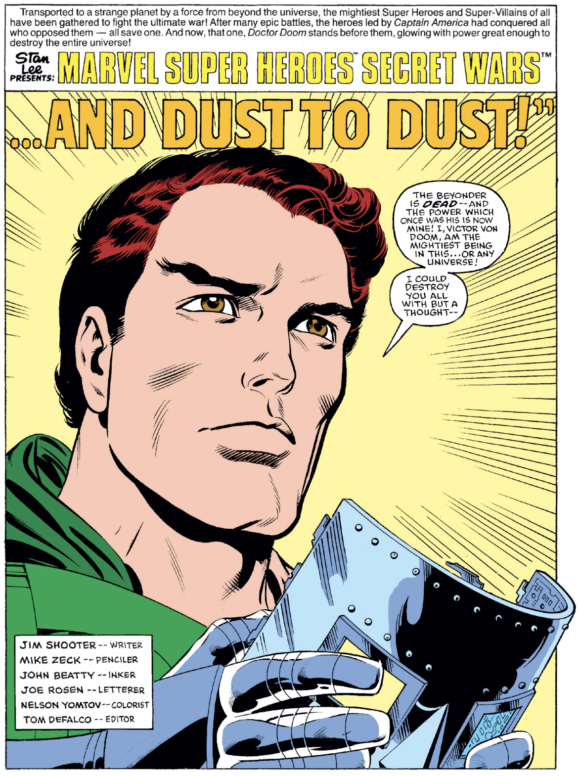
God-Doom summons the heroes to his fortress where he says he will grant them any boon they want, just as the Beyonder was going to do, but now they don’t have to kill anybody to do it. The suspicious heroes say thanks but no thanks, because, well, Doom. They all leave but Captain America, who stays behind to search for Spider-Woman, who has disappeared due to unexplained shenanigans.
Along the way, Doom raps with Cap (see what I did there) about his post-Battleworld plans. First on Vic’s itinerary is Hell, to kick Mephisto’s ass and free his witch mom’s soul. Cap rather ungenerously takes this as a sign that Doom has not, in fact, transcended all human desires like he claims, and at some point is going to revert to his villainous ways. So he calls a meeting of all the heroes and takes a vote as to whether or not they should attack God-Doom now, while his fortress is in their backyard.
What ensues is a discussion that would be right at home on the briefing room of the Starship Enterprise (there’s Roddenberry Syndrome again). Maybe I’m just an old cornball, but I dig that a full three pages of this comic is devoted to the heroes trying to come to a decision, as Cap insists the likely suicidal attack has to be unanimously agreed-to. Colossus is the lone hold-out, as he doesn’t want to jeopardize his idyllic life with alien hippie squeeze Zsaji.
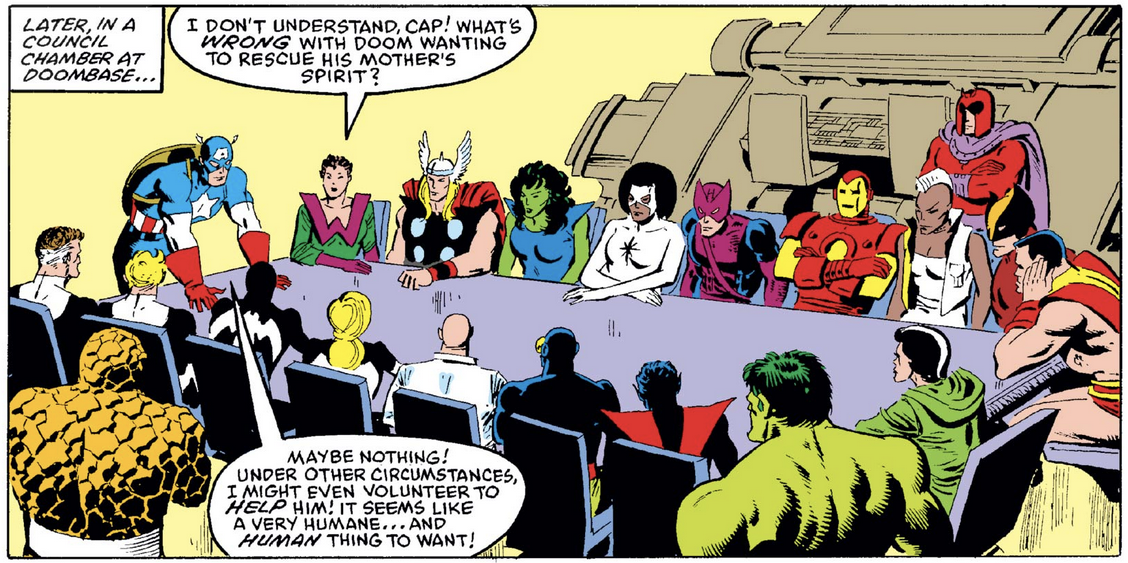
At this point I was reminded of another piece of Secret Wars merch I hadn’t looked at yet, namely MHSP1, the official adaptation of this story as a module for TSR’s Marvel Super Heroes Secret Wars (MSH) role-playing game. As you may know, I am an RPG historian as well as a comics historian. Tom Fowler’s and my successfully Kickstarted Game Masters: The Comic Book History of Role-Playing Games will hit store shelves next year (even though you missed the Kickstarter campaign, you can still preorder here!)
MSH was a mini-phenomenon in the 1980s: Its was TSR’s second biggest selling game next to, of course, Dungeons & Dragons. Its system by Jeff Grubb is fantastic, and there’s a bunch of online resources to let you still run it today. A few years ago I actually adapted it to run, of all things, a Jack Kirby-inspired New Gods campaign! So much fun. I really want to acquire the rights to the system and re-release it as the KIRBY RPG, heh.
The Secret Wars module is mostly stats of the various villains and heroes involved in the conflict, maps of Battleworld, and a few major scenes (amusingly, Magneto’s pointless attack on the heroes’ base in #2 is rightfully ignored), as well as a few fun ideas for encounters not in the comic itself, like alien refugees coming to ask for the heroes’ help and a feint by the villains under a phony flag of truce.
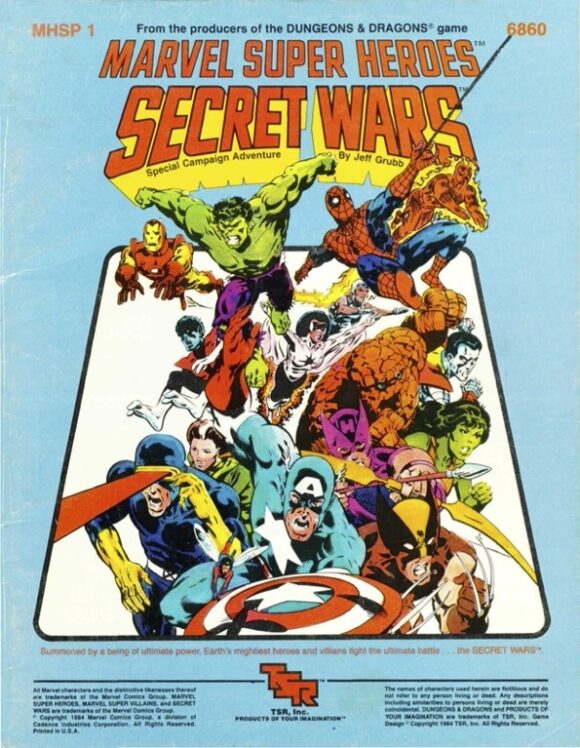
I was curious to see how the module would advise “Judges” (MSH’s Dungeon Masters) to handle the debate between the heroes in #11, but was disappointed to read that if the players vote against attacking God-Doom, they’re essentially punished:
“If they [accept Doom’s offer], they are immediately returned to Earth, but they will never gain new Karma [essentially, the game’s experience points]. All Karma they earn is given to Doom, instead. In addition, they are forever at Doom’s beck and call as a super-police force to enforce Doom’s will. Doom creates a Utopia on Earth for his followers—and a hell for those who do not.”
Geez, that seems a bit harsh. Is there no possibility that Doom is telling the truth, and actually can be cured of his villainous tendencies with his new god-like powers?
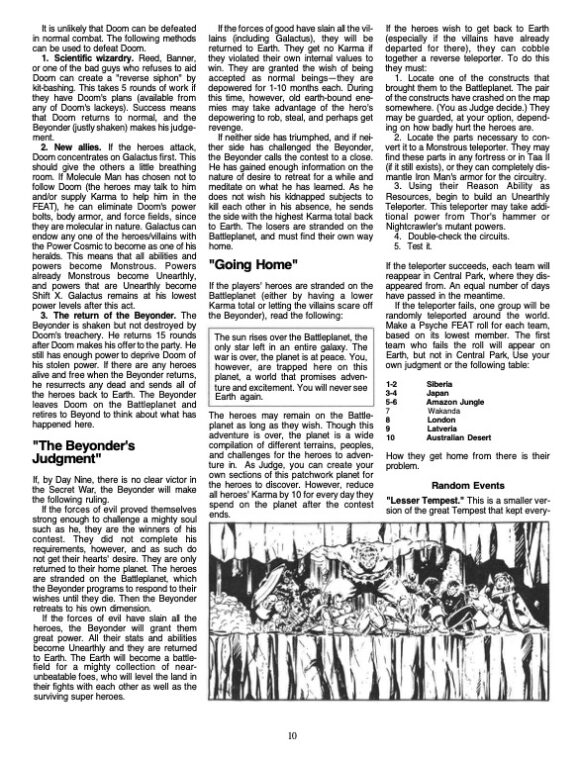
To the module’s credit, it does not advise Judges to do what actually happens in the comic, namely that the minute Colossus changes his mind and joins the now-unanimous vote to attack God-Doom, God-Doom slays all the heroes with a giant bolt from the sky.
If I did that to my players, there’d be a riot.
—
Crisis on Infinite Earths #11: “Aftershock”
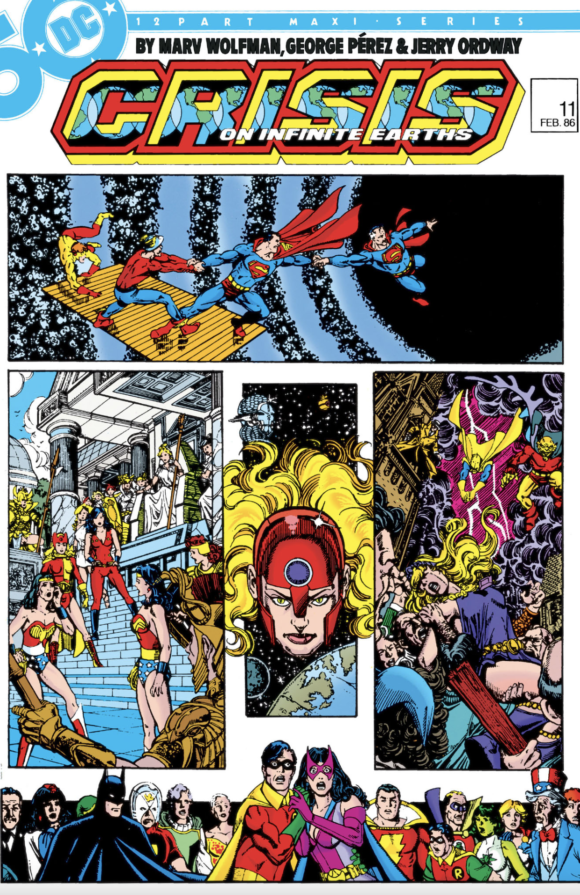
As near as I can tell, Mayfair Games’ contemporaneous DC Heroes Roleplaying Game never did an RPG adaptation of Crisis, likely because the game didn’t come out until 1986 and the event was over. I bet DC wanted Mayfair to focus on the “new,” post-Crisis continuity. This is probably just as well, because, considering how complicated Crisis is, that module would have been 500 pages long.
Part of what’s going on here, you don’t need me to tell you, is that Marv Wolfman and George Perez are trying to cram literally every DC character ever into this book. Every story truly is somebody’s favorite story, and really, that was the whole point of Earth-Two and the rest of the DC Multiverse in the first place. Everyone who’s a fan of the Jay Garrick Flash, or the cowl-masked Hawkman, or Old Superman, can be reassured that their favorites never went anywhere as time continued to march on.
Earth-Two is like if that farm your parents said your elderly dog moved to really did exist, and you could still visit it and check in on Spot and/or Alan Scott Green Lantern from time to time.
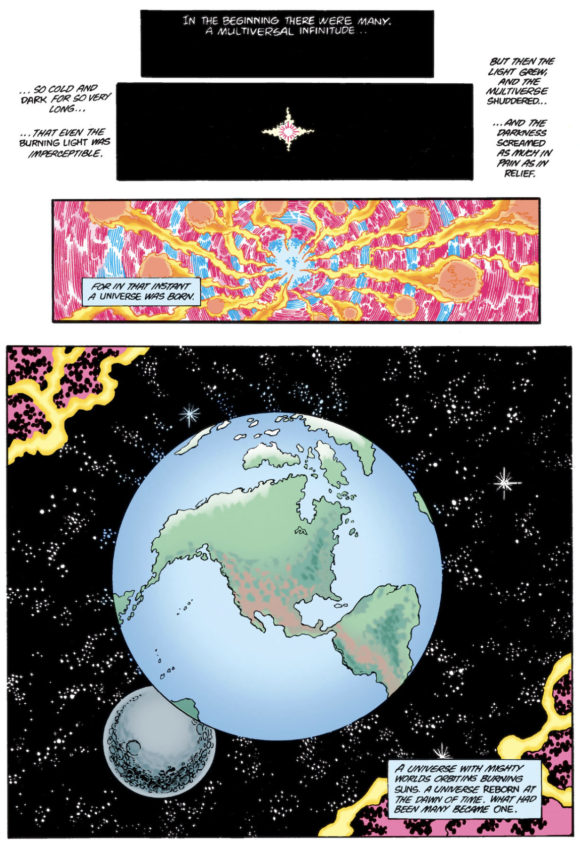
Until now. After last issue’s Dawn of Time kablooey, there’s only one Earth, and only the heroes who were present at said kablooey are still around to remember the others. This entire issue is basically mourning for the lost Multiverse; though it’s the Earth-Two heroes crying on the page, really, just as real-life funerals are for the living, this funeral is for the fans, to give them a beat to absorb the loss.
You’ve heard of Fan Service? This is Fan Grief.
Case in point: Old Dick, er, sorry, Old Robin I mean, Mr. Grayson, goes to Earth-Only Wayne Manor and finds Earth-Two Huntress, Helena Wayne, crying over the absence of her father’s, Bruce Wayne’s, headstone.
I get that she’s sad because that indicates the world she knew is gone, but still, just think about this for more than a second: You have a person upset because her dad isn’t dead anymore. That’s weird. Even if we don’t realize it consciously at the time, it’s still a dissonant emotional note for those of us not suffering from Fan Grief.
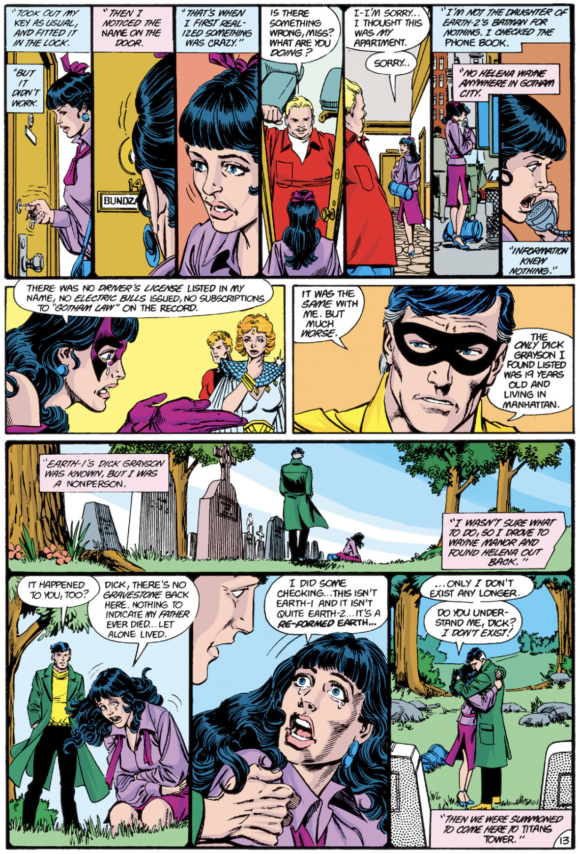
There’s got to be a vanishingly small demographic who’s like, “You know what? I want to read about the adventures of Clark Kent, Lois Lane, Wonder Woman, Robin, etc., but only when they’re really old.” One would assume that’s partly why the powers at DC decided to do away with them via Crisis:
Sorry, Timmy, we’ve got some bad news about Spot. There’s no farm, and no, you can’t go visit him anymore.
Superhero Fans have a curious obsession with stories “mattering.” There’s a dissatisfaction with “Imaginary Stories,” which, as Alan Moore once famously said, they of course all are. I’ve never quite squared that with the fact fans can’t seem to get enough of Batman’s and Superman’s origins being told again and again and again. All these different versions can’t all be right, right? What is this, the Bible?
A reporter supposedly once asked Stephen King if he was upset that his books were erased by so many bad movie versions. King replied, gesturing behind him to all his books on the shelves behind his chair, “What do you mean erased? They’re all still there.”
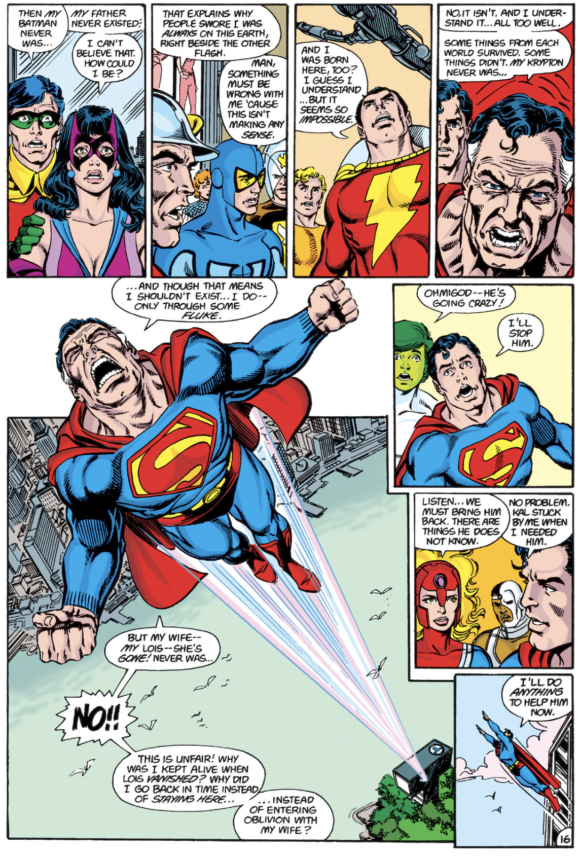
Stories don’t need corporate stamps of approval to “matter,” they matter if they matter to you, and they still exist, forever, in your Mylar bags or your Kindle and can never be erased, by the Anti-Monitor or Jenette Kahn or anyone else. That’s where they live forever, in your memory and in your heart.
So while I can intellectually respect Fan Grief, I cannot really get emotionally as worked up as OG Huntress at the demise of Earth-Two. And I can’t help but admire the pure balls of ending something called “Secret Wars” on a committee meeting. Ergo:
ROUND 11 WINNER: SECRET WARS
—
Our Tally So Far: CRISIS 6, SECRET WARS 5
—
MORE
— COMIC BOOK DEATH MATCH: Secret Wars #10 vs. Crisis on Infinite Earths #10. Click here.
— The Complete COMIC BOOK DEATH MATCH Index. Click here.
—
13th Dimension contributor Fred Van Lente is an award-winning, New York Times-bestselling comics writer, as well as an occasional novelist, teacher, and playwright. Sign up for updates on his upcoming projects and check out the trailer for his comics-writing course at his web site, fredvanlente.com.

November 2, 2024
Hi Fred,
RE: You have a person upset because her dad isn’t dead anymore.
I think you missed the dialogue in the appropriate (and preceding) panels. Helena is hardly upset that her father isn’t dead anymore, but that the absence of the Golden Age Bruce Wayne’s grave is evidence that he’s been erased from history–a far deeper, emotional loss I would suppose than losing him the first time when Bill Jensen killed him (mourning his passing is one thing; but how do you mourn his now-non-existence?).
She clearly explains this to an approaching Richard Grayson: the world they are inhabiting, despite having a Wayne Manor where each is standing, isn’t quite Earth 1 nor Earth 2 anymore. It appears to be a different planet Earth, where, for Richard and Helena, even the very objective records that prove one’s identity (and so existence), driver’s license, phone records, etc., no longer exist —as she explained in Titans Tower. So, she doesn’t exist in this new world even if paradoxically present, as culminating in that ultimate moment at Wayne Manor when the proof of her erasure from history becomes horrifyingly palpable from the fact of her own father’s erasure.
I do agree (if you were intending it as a criticism), that Crisis # 11, was too much of a dumping ground exclusively for Earth-2 heroes (esp. as I always much liked the Earth-2 Robin and Huntress). And yet the very fact that these heroes are even referred to as “Earth-2” heroes (despite being the original DC superheroes) clearly shows how they were to have had a relegated, and not primary, continuity anyway when they were revived in the early 1960s following “The Flash of Two Worlds” (your analogy to the supposed farm your parents sent your pet dog to is a highly apt one).
Thanks!
November 2, 2024
I can’t agree with William more. He’s nailed it I feel. It’s more than the fans’ grief being reflected. Everyone wants to think their history, their stories matter. I feel Helena’s pain. (Though I have a bigger issue with the dig at the Bible in the review itself. I just wish we could stay grounded in comics of our youth and not have to engage in religion or politics.) I really think this issue of Crisis is why I never went back to re-read it again. Just too painful.
November 2, 2024
I think William Roark has done a good job of explaining why the Huntress’ distress is understandable. But I also want to explain why some old-time fans were distressed. Though many have said it was because the past stories never happened, I think it also was because their favorite characters were significantly changed forever (or so we thought!). Up until then, retellings of origins might add some new aspect but the basic premise was the same. With Crisis, origins and characters could be significantly changed going forward, affecting fans’ future acceptance of the characters they had loved. I’m not saying no changes should ever be made (I kind of liked the return of Ma and Pa Kent.), but I think long-time fans are able to accept them more when they are done organically (Dick Grayson moves out and goes to college and when he becomes an adult, he adopts a new identity, for example.), instead of a writer or editor waving a magic wand and saying everything has changed. It seems pretty lazy as a rule.
And many Biblical scholars assume differences in the Gospels (as well as two accounts of the world’s creation in Genesis) reflect aspects of the same overall narratives their authors chose to focus on that don’t necessarily conflict. But I don’t want to get into a long debate about it as I don’t think this is really the place for that.
November 2, 2024
“I’ve never quite squared that with the fact fans can’t seem to get enough of Batman’s and Superman’s origins being told again and again and again.”
I am NOT one of these fans. Especially in the past few years, those origins seem to be the only stories being (re)told, or shoehorned in. Flashback to Crime Alley. “With great power…” Lazy, lazy, lazy writing.
Batman’s origin, especially, seems to be most writer’s crutch. They made an entire series about with Gotham. It even made it into the “Joker” movie.
The Teen Titans Go! movie joked that the Batmobile, Alfred and Batman’s utility belt would all get movies. Then “Pennyworth” came out, there’s a kids series about Batwheels. No word on the utility belt project.
I like Batman, but they will get every drop of blood from that stone. No other DC book seems to sell, and Batman is all over every other media, from toys to video games.
November 3, 2024
From what I understand, Marv & George’s original concept for Crisis was that when history reset with only one Earth, virtually NOBODY, beginning of time or not, remembered anything had ever been any other way – & it was protests from several in DC editorial that this would undermine whole storylines etc, as well as somehow “invalidate” the sacrifices of such as The Flash & Supergirl if no one even remembered them let alone their sacrifice (to be completely erased actually always struck me as arguably the noblest sort of self-sacrifice, but whuddo I know?) that egged Dick Giordano to make peace & ask Marv/George to restructure things a little. But, really, without everyone losing all memory of “the old continuity,” rather than the fresh start Marv certainly originally envisioned, it was mere months before various offices in DC editorial started resurrecting & once again referring to all the old continuity whose extermination was the original intent of COIEs…
November 4, 2024
TRUE STORY: I have that panicked reaction image of E2 Robin and Huntress from the Crisis #11 cover as a tattoo on me.